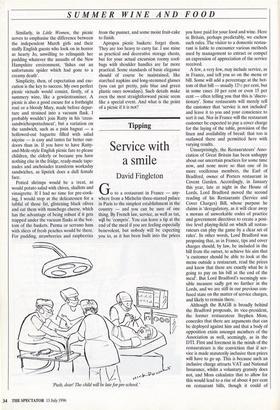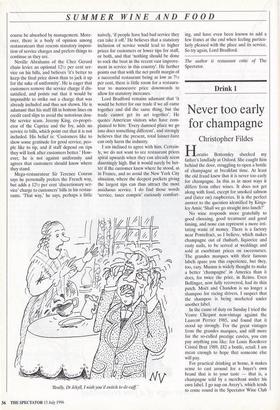Tipping
Service with a smile
David Fingleton
Go to a restaurant in France — any- where from a Michelin three-starred palace in Paris to the simplest establishment in the country — and you can be sure of one thing. By French law, service, as well as tax, Win be 'compris'. You can leave a tip at the end of the meal if you are feeling especially benevolent, but nobody will be expecting you to, as it has been built into the prices
'Push, dear! The child will e late for pre-school' you have paid for your food and wine. Here in Britain, perhaps predictably, we eschew such rules. The visitor to a domestic restau- rant is liable to encounter various methods used by management to extract or compel an expression of appreciation of the service received.
A few, a very few, may include service, as in France, and tell you so on the menu or bill. Some will add a percentage at the bot- tom of that bill — usually 1210 per cent, but in some cases 10 per cent or even 15 per cent — often telling you that this is 'discre- tionary'. Some restaurants will merely tell the customer that 'service is not included' and leave it to you and your conscience to sort it out. Nor in France will the restaurant customer be expected to pay a cover charge for the laying of the table, provision of the linen and availability of bread: that too is outlawed there and permitted here with varying results.
Unsurprisingly, the Restaurateurs' Asso- ciation of Great Britain has been unhappy about our uncertain practices for some time now, and none more so than one of its more vociferous members, the Earl of Bradford, owner of Porters restaurant in Covent Garden. Accordingly, in January this year, late at night in the House of Lords, Lord Bradford moved the second reading of his Restaurants (Service and Cover Charges) Bill, whose purpose he claims is 'deregulatory, as it will clear away a morass of unworkable codes of practice and government directives to create a posi- tive level playing-field on which all restau- rateurs can play the game by a clear set of rules'. In other words, Lord Bradford was proposing that, as in France, tips and cover charges should, by law, be included in the bill from the outset, to achieve his aim that 'a customer should be able to look at the menu outside a restaurant, read the prices and know that these are exactly what he is going to pay on his bill at the end of the meal'. But Lord Bradford's seemingly sen- sible measure sadly got no further in the Lords, and we are still in our previous con- fused state on the matter of service charges, and likely to remain there.
Although the RAGB is broadly behind the Bradford proposals, its vice-president, the former restaurateur Stephen Moss, concedes that there are arguments that can be deployed against him and that a body of opposition exists amongst members of the Association as well, seemingly, as in the DTI. First and foremost in the minds of the restaurateurs is the conviction that if ser- vice is made statutorily inclusive then prices will have to go up. This is because such an inclusive charge attracts VAT and National Insurance, whilst a voluntary gratuity does not, and Moss calculates that to allow for this would lead to a rise of about 4 per cent on restaurant bills, though it could of course be absorbed by management. More- over, there is a body of opinion among restaurateurs that resents statutory imposi- tion of service charges and prefers things to continue as they are.
Neville Abrahams of the Chez Gerard chain levies an optional 121a per cent ser- vice on his bills, and believes 'it's better to keep the final price down than to jack it up for the sake of uniformity'. He is eager that customers remove the service charge if dis- satisfied, and points out that it would be impossible to strike out a charge that was already included and thus not shown. He is adamant that his staff fill in bottom lines on credit card slips to avoid the notorious dou- ble service scam. Jeremy King, co-propri- etor of the Caprice and the Ivy, adds no service to bills, which point out that it is not included. His belief is: 'Customers like to show some gratitude for good service, peo- ple like to tip, and if staff depend on tips they will look after customers better.' How- ever, he is not against uniformity and agrees that customers should know where they stand.
Mega-restaurateur Sir Terence Conran says he personally prefers the French way, but adds a 121/2 per cent 'discretionary ser- vice' charge to customers' bills in his restau- rants. 'That way,' he says, perhaps a little naively, `if people have had bad service they can take it off.' He believes that a statutory inclusion of service would lead to higher prices for customers or lower tips for staff, or both, and that 'nothing should be done to rock the boat in the recent vast improve- ment in service in this country'. He further points out that with the net profit margin of a successful restaurant being as low as 71/2 per cent, there is little room for a restaura- teur to manoeuvre price downwards to allow for statutory increases.
Lord Bradford remains adamant that 'it would be better for our trade if we all came together and did the same thing, but the trade cannot get its act together'. He quotes American visitors who have com- plained to him: 'Every damned place we go into does something different', and strongly believes that the present, total laisser-faire can only harm the industry.
I am inclined to agree with him. Certain- ly, we do not want to see restaurant prices spiral upwards when they can already seem dauntingly high. But it would surely be bet- ter if the customer knew where he stood, as in France, and so avoid the New York City situation, where the deepest pockets giving the largest tips can thus attract the most assiduous service. I do find those words `service, taxes compris' curiously comfort- Really, Dr Jekyll I wish you'd switch to de-caff ' ing, and have even been known to add a few francs at the end when feeling particu- larly pleased with the place and its service. So try again, Lord Bradford.
The author is restaurant critic of The Spectator.



































































 Previous page
Previous page